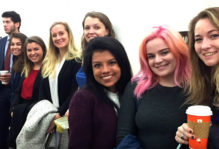Teaching for the W&M Washington Center
Throughout my educational training, I was committed to delaying specialization and instead explore communities. I majored in Sociology, Communication and later Counseling Psychology and finally Educational Policy, Planning, and Leadership. I was most interested in examining people and communities, individuals and systems. I was and continue to be enamored with people and groups.
For the past ten years, I have taught in the W&M Washington Center. I have used a teaching and learning method that priorities student questions, ideas, and analyses. Inquiry-based teaching and learning is an effective pedagogy for teaching in the Washington Center. From a student perspective, inquiry-based learning focuses on investigating complex questions and problems. The student is challenged to ask probing questions, collecting data, using evidence-based reasoning and qualitative inquiry practice to develop conclusions. Inquiry-based teaching allows me to build a community of learners by moving students beyond general curiosity for the topic into critical thinking and a more nuanced understanding of the topics. I needed to make explicit the rationale for the Washington Center model. We would develop a basic understanding of problems and challenges in order to develop a set of common questions to be asked at each site visit and with each guest in order to support students’ investigation using qualitative research practice. By providing structure for meeting with experts and touring sites, we created a research-rich environment, with data collection serving as a priority.
Students are taught the fundamentals of qualitative research with real-world experimentation in our Washington Center setting. Rather than simply going on field trips and hoping for something to stick, qualitative inquiry forms the basis for our experience. Students learn about the process that seeks an in-depth understanding of individuals and groups in their professional setting. Students are required to focus on “why” rather than “what” in making sense of the interactions and responses.
I build a classroom culture that relies on multiple systems of inquiry simultaneously while learning about the main topic and sub-topics of the class. Students are provided biography, case studies, history of the organization and they are expected to collect evidence for communication analysis, organizational structure, company norms, and organizational challenges. We focus on the individual, the organization and the field (individual, society, and culture) and we dig into language and communication.
As emerging professionals, our students are using qualitative inquiry to make sense of how individuals and groups make meaning. Students hear often from me that from a position of neutrality, we are engaging in analysis of individuals and systems, actions and structures. This approach is borrowed from best practice in ensuring rigor and trustworthiness in the inquiry process. The judgment of a person or place based on bias or stereotype has no place in our process.
One of the most rewarding parts of designing this program is that what could be perceived as a very practical, skills-based program, is actually based in the tradition of the Humanities. We’ve always been thirsty for understanding the people, the systems and the cultures in which we live. Prior to the enlightenment, people believed that the process of knowing was absolute and grounded in Truths. As the pursuit of knowledge emerged in the late 18th century, philosophers developed the principles for how I teach in the Washington Center. Life consists of what we experience and our reflections on those experiences. We do not live in isolation and we work in and provide leadership in a matrix of complex relationships that creates even more complex organizations. In DC we study individuals and organizations in the context of their lived experience, their cultural and social connections.
Teaching for the Washington Center gives me the freedom to help students discover ideas and their voices. A thought or sentiment guides our work together and it also summarizes how I feel about teaching for the Washington Center:
When we understand that we have the awesome power to paint our life story, we are free. We no longer feel the need to impose our story on others and to defend our interpretation of the world. Instead, we see all of us as artists with the right to create our evolving masterpiece.


No comments.
Comments are currently closed. Comments are closed on all posts older than one year, and for those in our archive.